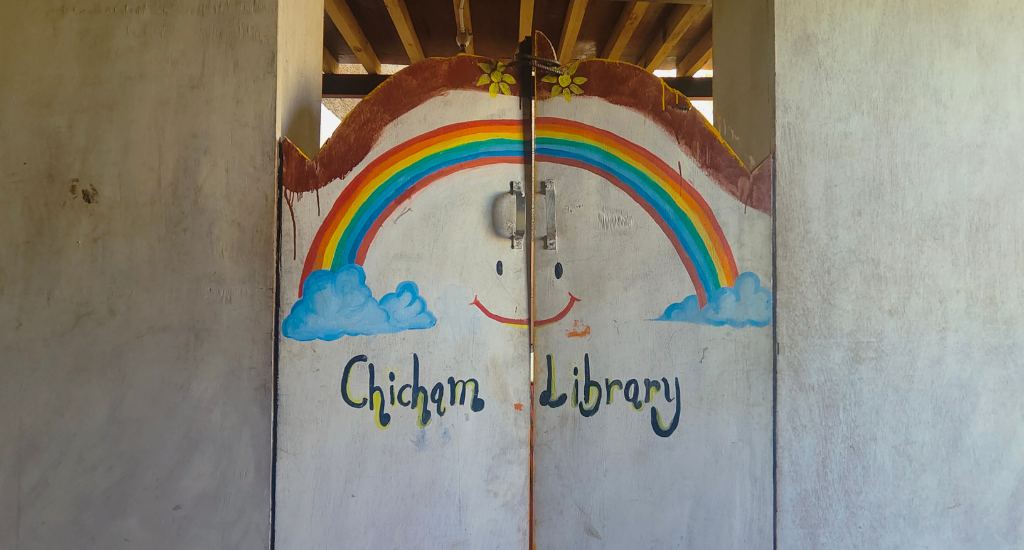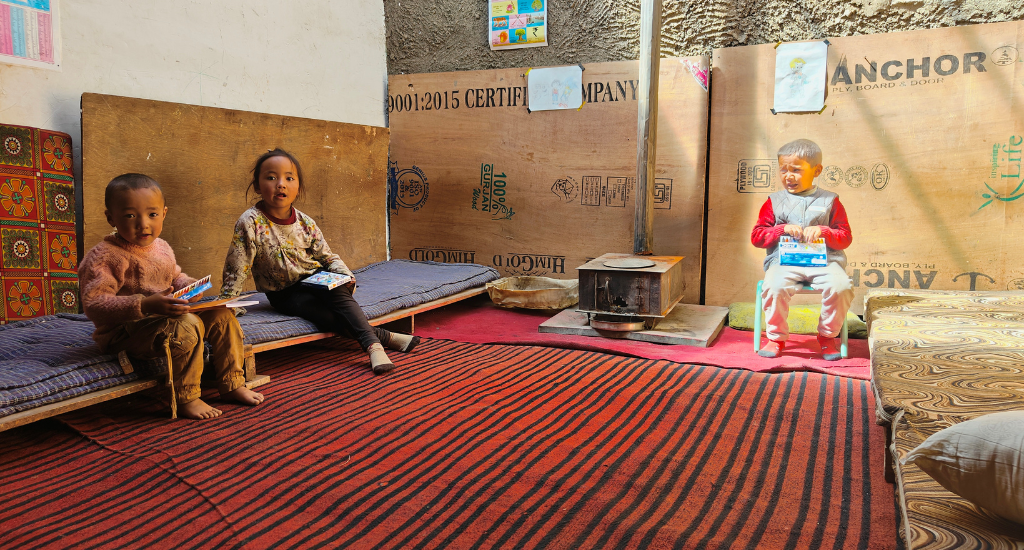
This hidden library in Spiti is a book lover’s paradise
When Takpa Tanzin saw his daughter struggling to find reference books for her coursework during the Covid-19 lockdown, he built a library in Chicham, their remote village in Spiti valley.

When Takpa Tanzin saw his daughter struggling to find reference books for her coursework during the Covid-19 lockdown, he built a library in Chicham, their remote village in Spiti valley.
Roadblocks frequently appear out of the blue in the far stretch of Spiti Valley in northern Himachal Pradesh, where Takpa Tanzin lives with his family. But this 41-year-old father of three daughters does not let obstacles trouble him for too long. He figures out a way.
He is a native of Chicham village, nestled at an elevation of 13,596 feet and renowned for Asia’s highest suspension bridge in the majestic but remote Spiti Valley, where snow-capped peaks touch the sky.
For two decades, Takpa has been a tour guide, steering treks and village tours across Spiti, Ladakh, Manali, Shimla, and Kinnaur. His journey into this realm of travel began serendipitously. A chance encounter with a Delhi-based travel company seeking a porter for a Ladakh trek revealed trekking and tour guiding to Takpa. Since then, he has been unwavering in introducing tourists to the uncharted beauty of Spiti Valley, proudly sharing its hidden wonders.
Rudyard Kipling described Spiti Valley in his book “Kim” as a world within a world. But even this untouched world was swept up in the devastating coronavirus outbreak, dealing a harsh blow as Spiti succumbed to a complete lockdown.
Also Read: Asia’s ‘biggest’ underground library in Rajasthan has no readers

In a village where alternative livelihoods are scarce, the absence of tourism had severe repercussions. Agriculture proved challenging, and minimal snowfall added to the difficulties. Takpa faced a personal challenge as he was forced to shift his daughter from a private to a government school, and the lack of reliable internet connectivity disrupted their education.
Undeterred, Takpa’s entrepreneurial spirit emerged resilient. Transforming his homestay into a haven of knowledge, he established a small library for both children and adults in Chicham, combatting the shadows of winter’s off-season when idleness often ushers in undesirable habits in the Spiti Valley.
His inspiration? His daughter Kesang Ankit, who struggled to find reference books for her coursework. “One fine day my daughter asked me to get her the reference books. Never in my life had I heard this term,” lamented Takpa. “There are network (phone/internet) issues, making online classes inaccessible. None of my friends or relatives could arrange the books. That day, the fact that I’m illiterate defeated me.”
It was this moment of struggle that birthed the idea of Chicham Library. To arrange funds, he even sold his Maruti Alto car. With the support of Ecosphere, an NGO working for environment and sustainable development in Kaza, Takpa initiated the library with an initial donation of 60 books.
What followed was beyond his expectations. Takpa shared the library’s needs on social media, and books started pouring in from around the world. Visitors to Takpa’s homestay began contributing, acknowledging the warmth and service they had received.
Also Read: Atheism library attempts to stoke curiosity in Bihar village

“My inbox was full of messages. Lacking the reading skills, regretfully I couldn’t even reply to all of them. It made me realise that I’ve got the biggest family ever,” he said.
Takpa has created an oasis of knowledge in Chicham, a village historically known for being the convergence point of Tibetan Buddhism, sharing borders with Ladakh and Tibet.
Takpa reminisced about a time when Spiti itself was an elusive destination, requiring an inner line permit for Indian tourists until 2000. “We were not even on the country’s map a couple of decades ago,” he said.
For Chicham, the wait for recognition was prolonged. A tranquil neighbour to the more recognised Kibber village, a formidable gorge separated the two, discouraging tourism in Chicham. The landscape altered in 2017 with the installation of a suspension bridge at an awe-inspiring height, transforming the village into a magnet for wanderers.
Takpa narrated stories of guiding domestic as well as foreign visitors through this enchanting landscape. “I started as a porter helping foreign travellers. I have done the Par Langa trek 22 times,” he said.
As the library flourished, Takpa’s vision expanded beyond books. He yearned to preserve the cultural essence of Spiti, feeling a sense of loss due to rampant tourism and technological intrusion. “This library is meant to unite us the way we were. Mobile phones disconnected us,” he said, underlining the profound impact of technology on their traditional way of life.
Watch: Brakes on boredom: Karnataka’s bus stop libraries
Takpa’s life mirrors an Abbas Kiarostami film, where simplicity intertwines with profound narratives. Amidst concerns about losing his home to tourism, Takpa relentlessly works towards preserving Spiti Valley’s singular culture and values.

Raj Karan, a Delhi-based artist, emphasised Takpa’s commitment to ecological concerns. “You talk to Takpa and you’ll get a class on ecological concerns. His place in Chicham, known as Rustic Homestays, is a delight for the visitors. From sustaining the traditional craft of mud houses to installing bio-toilets, Takpa did everything on his own,” he said.
Takpa yearns for more support. “I am like a lonely shepherd awaiting people to come forward and contribute to this place. Together, we can create something that would be helpful for the generations to come,” he said.
As he observes children engrossed in books from around the world, Takpa reflects on the balance sheet of life. “Perhaps, I think this life never wanted to offer me the perks of education. I was meant to meet countless people helping me to build my road to life,” he wondered.
With a determined gaze, he concluded: “Next time, whenever and wherever I’ll be born, I’ll make sure to educate myself.” The road to life, indeed, goes on.
Also Read: Bird feathers flocked together at this Gujarat library
The lead image at the top shows the beautifully painted doors to the Chicham Library. (Photo by Pranay Tripathi)
Pranay Tripathi, an Indore-based upcoming filmmaker and a Rural Media Fellow 2022 at Youth Hub, Village Square.